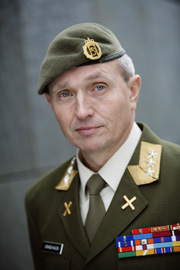Norway’s national military intelligence service (NIS, or Etteretningstjenesten) will be more open about its staff, operations and intelligence gathering, promises NIS Chief Kjell Grandhagen. The move towards more openness aims to reassure Norwegians that the service is not monitoring their every move in an era of explosive whistleblower spying allegations.

“There is no longer any credibility in answering ‘no comment’ to every question,” Grandhagen told newspaper Aftenposten. “I see that what’s in the public sphere has created the impression that the NIS (mostly called E-tjenesten in Norway) constitutes a threat against normal people and their private lives. I guess I’m the one in Norway who knows the phenomenon of international intelligence best. I can say that this fear is unfounded.”
Grandhagen said he’s concerned with the other organizations that pose a threat to citizens. “Commercial players, criminals, and there are hacker groups,” he explained. “Foreign intelligence services, whether they come from Norway or the USA or China, have one purpose: threats to their national security. I have no interest, no capacity and no ability to interest myself in normal peoples’ comings and goings, what communication they have with others, what information they’re sitting on.”
The service said it aimed to clear up misconceptions after whistleblower Edward Snowden revealed the extent of US surveillance, including claims that America’s National Security Agency (NSA) had monitored Norwegian phone conversations, and revelations of the NIS’s repository in Havnelageret, Oslo. “It would have come out anyway that the NSA didn’t monitor Norwegian citizens,” Grandhagen said. “The NSA would have illuminated that themselves. We were obliged to go out and say that it was us who were behind the data, that there were conversations we caught up in Afghanistan, in a warzone where we had Norwegian soldiers.”
Ordinary people
The NIS consists of about 15 percent military personnel and 82 percent civil workers, with backgrounds in fields including social science, religion, social anthropology, engineering and communication technology. “The main feature is the ability to make contact, talk with people, establish trust,” said Grandhagen.
Operators in the field internationally mostly gather information simply through meeting with other people. Grandhagen said there’s a big difference between the stereotypical view of the government agent that people see in books and films, and the way the service actually operates. “The majority of this type of work is quite routine, quite unexciting,” he explained. “In the sense that you are not up in situations where you risk your own life the whole time.” Grandhagen could not name any examples where a source had been killed as a result of contact with the NIS.
Grandhagen told Aftenposten that NIS’s work had saved lives in terror attacks, for instance when insurgents had stormed a Statoil plant at In Amenas in Algeria. “I will not go into details about the nationalities around that, but we know with certainty that five people were saved on the basis of the work we did.”
Grandhagen, meanwhile, has also been candid about trying to save another life in Oslo — his own. Norwegian Broadcasting (NRK) reported recently that Grandhagen has been tackling a serious cancer diagnosis but has managed to mostly keep working while undergoing treatment. Grandhagen, age 59, took over as head of Norway’s military intelligence agency in 2010 after a long career in the military.
newsinenglish.no/Emily Woodgate

